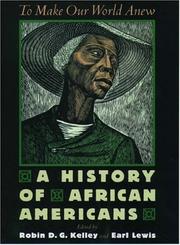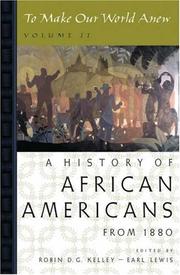| Listing 1 - 10 of 19 | << page >> |
Sort by
|
Book
ISBN: 0520066448 Year: 1991 Publisher: Berkeley Los Angeles Oxford University of California Press
Abstract | Keywords | Export | Availability | Bookmark
 Loading...
Loading...Choose an application
- Reference Manager
- EndNote
- RefWorks (Direct export to RefWorks)
Multi
ISBN: 9781400881260 9780691178837 1400881269 Year: 2016 Publisher: Princeton, NJ : Princeton University Press,
Abstract | Keywords | Export | Availability | Bookmark
 Loading...
Loading...Choose an application
- Reference Manager
- EndNote
- RefWorks (Direct export to RefWorks)
It is clear that in our society today, issues of diversity and social connectedness remain deeply unresolved and can lead to crisis and instability. The major demographic changes taking place in America make discussions about such issues all the more imperative. Our Compelling Interests engages this conversation and demonstrates that diversity is an essential strength that gives nations a competitive edge. This inaugural volume of the Andrew W. Mellon Foundation's Our Compelling Interests series illustrates that a diverse population offers our communities a prescription for thriving now and in the future.This landmark essay collection begins with a powerful introduction situating the demographic transitions reshaping American life, and the contributors present a broad-ranging look at the value of diversity to democracy and civil society. They explore the paradoxes of diversity and inequality in the fifty years following the civil rights legislation of the 1960s, and they review the ideals that have governed our thinking about social cohesion-such as assimilation, integration, and multiculturalism-before delving into the new ideal of social connectedness. The book also examines the demographics of the American labor force and its implications for college enrollment, graduation, the ability to secure a job, business outcomes, and the economy. Contributors include Danielle Allen, Nancy Cantor, Anthony Carnevale, William Frey, Earl Lewis, Nicole Smith, Thomas Sugrue, and Marta Tienda. Commentary is provided by Kwame Anthony Appiah, Patricia Gurin, Ira Katznelson, and Marta Tienda.At a time when American society is swiftly being transformed, Our Compelling Interests sheds light on how our differences will only become more critical to our collective success.
Political sociology --- Politics --- Civil society --- Democracy --- Cultural pluralism --- Social aspects --- Economic aspects --- Political aspects --- United States.
Book
ISBN: 0691170487 0691178836 1400881269 Year: 2016 Publisher: Princeton, NJ : Princeton University Press,
Abstract | Keywords | Export | Availability | Bookmark
 Loading...
Loading...Choose an application
- Reference Manager
- EndNote
- RefWorks (Direct export to RefWorks)
It is clear that in our society today, issues of diversity and social connectedness remain deeply unresolved and can lead to crisis and instability. The major demographic changes taking place in America make discussions about such issues all the more imperative. Our Compelling Interests engages this conversation and demonstrates that diversity is an essential strength that gives nations a competitive edge. This inaugural volume of the Andrew W. Mellon Foundation's Our Compelling Interests series illustrates that a diverse population offers our communities a prescription for thriving now and in the future.This landmark essay collection begins with a powerful introduction situating the demographic transitions reshaping American life, and the contributors present a broad-ranging look at the value of diversity to democracy and civil society. They explore the paradoxes of diversity and inequality in the fifty years following the civil rights legislation of the 1960s, and they review the ideals that have governed our thinking about social cohesion-such as assimilation, integration, and multiculturalism-before delving into the new ideal of social connectedness. The book also examines the demographics of the American labor force and its implications for college enrollment, graduation, the ability to secure a job, business outcomes, and the economy. Contributors include Danielle Allen, Nancy Cantor, Anthony Carnevale, William Frey, Earl Lewis, Nicole Smith, Thomas Sugrue, and Marta Tienda. Commentary is provided by Kwame Anthony Appiah, Patricia Gurin, Ira Katznelson, and Marta Tienda.At a time when American society is swiftly being transformed, Our Compelling Interests sheds light on how our differences will only become more critical to our collective success.
Political sociology --- Civil society --- Democracy --- Cultural pluralism --- Cultural pluralism --- Social aspects --- Economic aspects --- Political aspects --- United States. --- Affirmative action. --- African Americans. --- American Academy of Arts and Sciences. --- Americans. --- Antonin Scalia. --- Associate degree. --- Baby boomers. --- Bachelor's degree. --- Black people. --- Career. --- Civil society. --- Community college. --- Competition. --- Competitiveness. --- Consumption (economics). --- Culture. --- Danielle Allen. --- Demographic transition. --- Demography of the United States. --- Demography. --- Distrust. --- Diversity Explosion. --- Economic inequality. --- Economy. --- Education. --- Educational attainment. --- Educational inequality. --- Elena Kagan. --- Employment. --- Equal Protection Clause. --- Equal opportunity. --- Ethnic group. --- Funding. --- Georgetown University. --- Grandparent. --- Group dynamics. --- Harvard University. --- Higher education. --- Human capital. --- Illegal immigration. --- Immigration reform. --- Immigration. --- In-group favoritism. --- Income distribution. --- Income. --- Institution. --- Intersectionality. --- Investment. --- Jews. --- Lecture. --- Legislation. --- Massification. --- Mexicans. --- Minority group. --- Multiculturalism. --- Nationality. --- New York University. --- Of Education. --- Percentage. --- Person of color. --- Political science. --- Politics. --- Poverty. --- Productivity. --- Public policy. --- Race (human categorization). --- Racial integration. --- Racial segregation. --- Racism. --- Research and development. --- Scott E. Page. --- Self-confidence. --- Self-esteem. --- Service economy. --- Sexual orientation. --- Skill. --- Slavery. --- Social capital. --- Social connectedness. --- Social inequality. --- Social mobility. --- Social organization. --- Social relation. --- Social science. --- Social structure. --- Society. --- Socioeconomic status. --- Sociology. --- Stereotype threat. --- Suburb. --- Sun Belt. --- Thomas Sugrue. --- University of Michigan. --- University system. --- Wealth. --- Welfare. --- Well-being. --- White people. --- Women's studies. --- Workforce.

ISBN: 9780316525589 Year: 2004 Publisher: London Time Warner
Abstract | Keywords | Export | Availability | Bookmark
 Loading...
Loading...Choose an application
- Reference Manager
- EndNote
- RefWorks (Direct export to RefWorks)
Als je veel haar hebt en je mama moet het stevig kammen dan kan het wel pijn doen. Als kind vind je dat niet fijn tot mama je vertelt hoe mooi je wel bent met je haar. Zwart kroezelhaar dat je op zoveel verschillende manieren kan kammen. Mensen kijken naar je omdat je vlechtjes mee dansen als je over straat huppelt of geven je het gevoel dat je kan vliegen! Een vrolijk boek over het haar van een zwart meisje.
Book
ISBN: 1280845430 9786610845439 0198040067 9780198040064 0199839824 Year: 2005 Publisher: Oxford New York Oxford University Press
Abstract | Keywords | Export | Availability | Bookmark
 Loading...
Loading...Choose an application
- Reference Manager
- EndNote
- RefWorks (Direct export to RefWorks)
The two volumes of Kelley and Lewis's To Make Our World Anew integrate the work of eleven leading historians into the most up-to-date and comprehensive account available of African American history, from the first Africans brought as slaves into the Americas, right up to today's black filmmakers and politicians. This first volume begins with the story of Africa and its origins, then presents an overview of the Atlantic slave trade, and the forced migration and enslavement of between ten and twenty million people. It covers the Haitian Revolution, which ended victoriously in 1804 with the birth
African Americans --- Black history --- History. --- United States --- African Americans history --- history

ISBN: 0195139453 Year: 2000 Publisher: Oxford ; New York : Oxford University Press,
Abstract | Keywords | Export | Availability | Bookmark
 Loading...
Loading...Choose an application
- Reference Manager
- EndNote
- RefWorks (Direct export to RefWorks)
African Americans --- Noirs américains --- History. --- Histoire

ISBN: 0199839018 1283098261 9786613098269 0199838933 9780199838936 0195181352 9780195181357 Year: 2005 Publisher: Oxford New York Oxford University Press
Abstract | Keywords | Export | Availability | Bookmark
 Loading...
Loading...Choose an application
- Reference Manager
- EndNote
- RefWorks (Direct export to RefWorks)
The two volumes of Kelley and Lewis's To Make Our World Anew integrate the work of eleven leading historians into the most up-to-date and comprehensive account available of African American history, from the first Africans brought as slaves into the Americas, right up to today's black filmmakers and politicians. This second volume covers the crucial post-Reconstruction years and traces the migration of blacks to the major cities. It describes the remarkable birth of the Harlem Renaissance, the hardships of the Great Depression, and the service of African Americans in World War II. Readers with
African Americans --- Civil rights --- History.
Book
ISBN: 9782924645468 Year: 2020 Publisher: Sherbrooke, Québec : Editions D'eux,
Abstract | Keywords | Export | Availability | Bookmark
 Loading...
Loading...Choose an application
- Reference Manager
- EndNote
- RefWorks (Direct export to RefWorks)
Book

ISBN: 0691193827 0691191530 Year: 2019 Publisher: Princeton, NJ : Princeton University Press,
Abstract | Keywords | Export | Availability | Bookmark
 Loading...
Loading...Choose an application
- Reference Manager
- EndNote
- RefWorks (Direct export to RefWorks)
How businesses and other organizations can improve their performance by tapping the power of differences in how people thinkWhat if workforce diversity is more than simply the right thing to do? What if it can also improve the bottom line? It can. The Diversity Bonus shows how and why. Scott Page, a leading thinker, writer, and speaker whose ideas and advice are sought after by corporations, nonprofits, universities, and governments, makes a clear and compelling practical case for diversity and inclusion. He presents overwhelming evidence that teams that include different kinds of thinkers outperform homogenous groups on complex tasks, producing what he calls "diversity bonuses." These bonuses include improved problem solving, increased innovation, and more accurate predictions-all of which lead to better results. Drawing on research in economics, psychology, computer science, and many other fields, The Diversity Bonus also tells the stories of businesses and organizations that have tapped the power of diversity to solve complex problems. The result changes the way we think about diversity at work-and far beyond.
Diversity in the workplace. --- Teams in the workplace. --- Personnel management. --- Knowledge economy. --- Accuracy and precision. --- Advertising. --- Affirmative action. --- African Americans. --- Americans. --- Analogy. --- Analytics. --- Asian Americans. --- Asset management. --- Biology. --- Board of directors. --- Boeing. --- Business case. --- Calculation. --- Career. --- Categorization. --- Causality. --- Classroom. --- Collaboration. --- Collective intelligence. --- Competition. --- Computer scientist. --- Cross-functional team. --- Customer. --- Decision-making. --- Demography. --- Economist. --- Effectiveness. --- Empirical evidence. --- Employment. --- Engineering. --- Ensemble learning. --- Entrepreneurship. --- Estimation. --- Explanation. --- Finding. --- Fluid and crystallized intelligence. --- Forecasting. --- Fortune 500. --- Gender diversity. --- Grutter v. Bollinger. --- Harvard University. --- Heuristic. --- Hidden Figures. --- Human resources. --- Income. --- Inference. --- Institution. --- Intelligence analysis. --- Intersectionality. --- Knowledge base. --- Larry Page. --- Majority minority. --- Marketing. --- Mathematician. --- Mathematics. --- Meritocracy. --- Microsoft. --- Mission statement. --- National Science Foundation. --- Netflix. --- New York University. --- Obesity. --- Organization. --- Organizational culture. --- Participant. --- Percentage. --- Philosopher. --- Political science. --- Prediction. --- Predictive modelling. --- Probability. --- Problem solving. --- Product design. --- Profession. --- Quality control. --- Quartile. --- Race (human categorization). --- Restaurant. --- Result. --- Robert Wood Johnson Foundation. --- Rule of thumb. --- Scientist. --- Sexual orientation. --- Social issue. --- Social science. --- State of the World (book series). --- Supply chain. --- Team composition. --- Technology. --- Theorem. --- Tool. --- Trade-off. --- Tradecraft. --- University of Michigan. --- Wealth. --- Weighting. --- Workforce. --- Workplace.

ISBN: 0190282266 0195087712 0199762481 Year: 1996 Publisher: Oxford University Press, Incorporated
Abstract | Keywords | Export | Availability | Bookmark
 Loading...
Loading...Choose an application
- Reference Manager
- EndNote
- RefWorks (Direct export to RefWorks)
| Listing 1 - 10 of 19 | << page >> |
Sort by
|

 Search
Search Feedback
Feedback About UniCat
About UniCat  Help
Help News
News